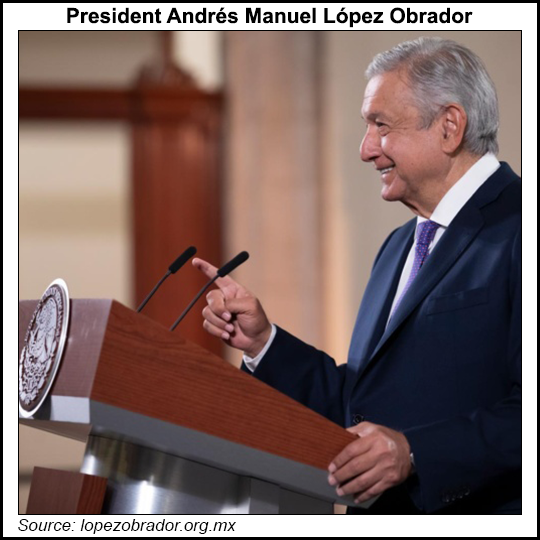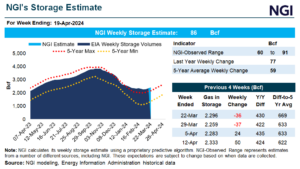Regulatory | Markets | NGI All News Access | NGI The Weekly Gas Market Report
Mexico’s AMLO Pledges Energy Prices Won’t Increase Amid Ukraine Conflict
Gasoline, diesel and electricity prices in Mexico will not increase beyond inflation despite the turmoil in global energy markets caused by Russia’s invasion of Ukraine, according to Mexican President Andrés Manuel López Obrador.

In his morning press briefings on Tuesday and Wednesday, López Obrador said the government will continue to subsidize gasoline prices, even as global oil prices skyrocket. He explained that the government will pay for the subsidies with “excess” oil export revenues brought in by state oil company Petróleos Mexicanos (Pemex) as a result of surging global crude prices.
“It’s important that all Mexicans know that we are not going to have problems with price increases for fuels or electricity, despite the invasion and war in Ukraine,” the president said.
He cited that under his administration, Pemex has “stabilized” a 14-year decline in crude output, adding that production is now “above what we received” when he took office in December 2018.
He added that Mexico’s gasoline imports have shrunk by 45% during his administration as a result of rehabilitating Pemex’s six refineries in Mexico and acquiring 100% ownership of the Deer Park refinery in Texas.
Pemex gasoline imports averaged 341,800 b/d in January, down from 598,400 b/d in full-year 2018.
“If we don’t control the price of fuels and electricity, it will skyrocket,” López Obrador said, explaining that capping prices will help to control inflation.
He cited that in Europe “they are suffering a lot because of the increase in prices of gas and electricity…”
Natural gas accounts for over 60% of Mexico’s electricity supply, with as much as 90% of the gas arriving via pipeline from the United States.
Natural gas traded in Europe for April delivery settled at $68.67/MMBtu on Tuesday, more than 15 times the U.S. benchmark Henry Hub.
Even the Henry Hub price, however, settled about 79% higher year/year on Tuesday.
While state power generator Comisión Federal de Electricidad (CFE) has hedges in place to offset natural gas price volatility, it will almost certainly not be enough, according to Mexico City-based energy expert Gonzalo Monroy.
He told NGI’s Mexico GPI that “if the president keeps his promise not to increase electricity prices, what we will see is higher volumes of electricity subsidies.”
Having already subsidized 100% of the excise tax (known by its Spanish initials IEPS) on gasoline sales in February to combat rising prices, Mexico’s finance ministry on Sunday announced additional fuel tax breaks.
The ministry said that “geopolitical tensions in the world have brought with them strong increases in the pieces of crude and international benchmarks for gasoline and diesel, essential fuels for the mobility of the population and for the transport of merchandise.” As a result, the government “has deemed it necessary to realize an additional stimulus to the IEPS for gasoline and diesel.”
Monroy explained that López Obrador campaigned on popular anger about the liberalization of fuel prices in 2017, the result of Mexico’s 2013-2014 energy reform. Since taking office, he has promised not to allow fuel prices to increase in real terms.
However, those promises were based on previous inflation forecasts, Monroy said.
Mexico’s 12-month inflation rate stood at 7.28% as of February, versus 3.76% in the same month last year, according to national statistics institute INEGI.
© 2024 Natural Gas Intelligence. All rights reserved.
ISSN © 2577-9877 | ISSN © 2577-9966 | ISSN © 1532-1266 |


